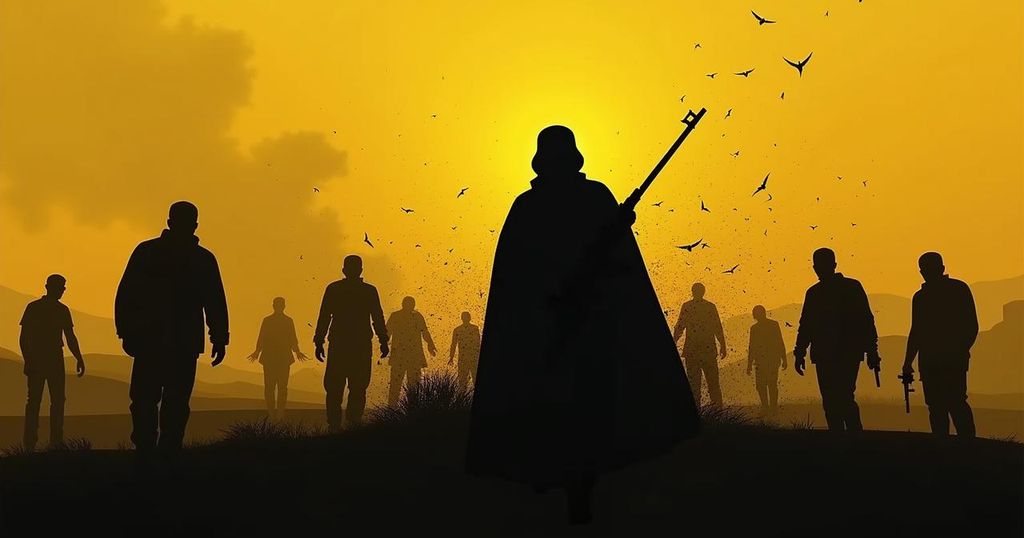Hezbollah’s leader Hassan Nasrallah was confirmed dead following an Israeli airstrike in Beirut. His death marks a significant escalation in the ongoing conflict between Israel and Hezbollah. The strike resulted in casualties and significant damage, prompting vows of continued resistance from Hezbollah. The event has further complicated the already tense situation in the region, with both sides preparing for potential further confrontations.
On Saturday, Lebanon’s influential Hezbollah group confirmed the death of its leader, Hassan Nasrallah, following an Israeli airstrike in Beirut a day earlier. In a statement, Hezbollah stated that Nasrallah had “joined his fellow martyrs” and vowed to continue their fight against Israel and in support of Palestine. Nasrallah, who had led Hezbollah for over thirty years, was the most significant figure killed by Israeli forces amid ongoing hostilities between the two groups. The Israeli military confirmed that their action targeted a meeting of Hezbollah leadership at their headquarters in Dahiyeh, south of Beirut. The airstrike resulted in six fatalities and injuries to 91 individuals, damaging six apartment buildings in the vicinity. The attack also claimed the life of General Abbas Nilforushan, a senior commander within Iran’s Revolutionary Guard, further complicating the situation and indicating the broader implications of the military confrontations. The assassination of Nasrallah marks a notable escalation in the already tense conflict, with air raid sirens sounding across parts of Israel in response to the increasing military engagements. Israeli Prime Minister Benjamin Netanyahu returned from a trip to the U.S. to address the escalating crisis, stating that the Israeli military had effectively acted on real-time intelligence over a span of years regarding Nasrallah’s movements. Hezbollah’s response signaled ongoing resistance, emphasizing that their campaign against Israel would intensify. Local reactions in Lebanon included gunfire in mourning of Nasrallah, underscoring the leader’s significant role in the organization and among his supporters. Furthermore, fears among civilians were evident as travelers rushed to leave Lebanon amid the uncertainty following the strike. As the conflict persists, Israel’s military leadership indicated that the strike was only part of a larger operational strategy, with Defense Minister Yoav Gallant deeming it “the most important targeted strike since the founding of the State of Israel.” The military indicated plans for continued operations against Hezbollah, reflecting a commitment to neutralize perceived threats along the Lebanese border. Hostilities had escalated since October 8, when Hezbollah began firing rockets into Israel in response to conflict in Gaza initiated by Hamas. The situation has rendered many Lebanese civilians homeless and brought increased military activities on both sides of the border. Israel noted the sustained and severe impacts of recent attacks, including targeted strikes on Hezbollah capabilities and defenses. Potential implications of Nasrallah’s death revolve around the potential for heightened military action by less senior Hezbollah members and the involvement of Iran in retaliatory strategies. While Israel has indicated a willingness to intensify their military efforts, the long-term effects of this recent development remain uncertain as regional dynamics evolve amid ongoing conflict.
The announcement of Hassan Nasrallah’s death sets a significant tone in the long-standing conflict between Israel and Hezbollah, which has seen increased hostilities since the escalation of tensions in October. Hezbollah, a prominent political and militant group in Lebanon, has been engaged in volatile confrontations with Israel, particularly in defense of Palestinian interests. This latest military strike and the ensuing reaction highlight the precarious security situation in Lebanon and the broader Middle East, where political and military alliances are complex and influence regional stability. The death of a major leader like Nasrallah raises questions about the future direction of Hezbollah and its operational capabilities, especially in relation to Iran’s support and objectives in the region.
In conclusion, the killing of Hassan Nasrallah by an Israeli airstrike marks a critical juncture in the ongoing conflict between Hezbollah and Israel, heightening fears of further escalation and military confrontation. Israel’s commitment to continue its operations against Hezbollah signals the potential for an extended campaign, while the implications of Nasrallah’s absence may alter the dynamics within the Hezbollah leadership. Both regional and international observers will be closely monitoring the situation as Hezbollah and its allies respond to maintain their influence amidst the unfolding crisis.
Original Source: www.pbs.org






